Occupy Central
Occupy Central is a civil disobedience movement which began in Hong Kong on September 28, 2014. It calls on thousands of protesters to block roads and paralyse Hong Kong's financial district if the Beijing and Hong Kong governments do not agree to implement universal suffrage for the chief executive election in 2017 and the Legislative Council elections in 2020 according to "international standards." The movement was initiated by Benny Tai Yiu-ting, an associate professor of law at the University of Hong Kong, in January 2013.
OCCUPY CENTRAL - DAY 34: Full coverage of the day’s events
Group wants to save Occupy protesters' artwork
Lawmaker urged to ensure police don't destroy pieces that have drawn worldwide attention
PUBLISHED : Friday, 31 October, 2014, 4:33am
The colourful Lennon Wall notes in Admiralty. Photo: EPA
An arts and culture group wants to make sure Hong Kong police do not destroy the creative works of Occupy protesters.
The group - including representatives from the Umbrella Movement Visual Archives and Research Collective, Hong Kong Shield, copyright concern group Keyboard Frontline and theatre artists - raised the issue with Ma Fung-kwok, a lawmaker representing culture and sports, in a meeting yesterday.
Artist Wen Yau, a member of the collective which wants to archive the items, said the group urged Ma to talk to the government and police to urge them not to demolish the works when they are clearing protest sites.
"We asked him to tell the police that these works are worth keeping," said Wen.
"We also asked him to tell the police not to arrest volunteer field researchers collecting and retrieving the creative works in case of site clearance."
She said, however, that the group was worried about Ma's ambivalent stance to the creative pieces, such as the Umbrella Man sculpture and Lennon Wall, a rainbow collage of colourful notes in Admiralty.
The artistic creations have drawn international attention from the media and the art world. Western curators have expressed interest in exhibiting works overseas, including a curator for the Disobedient Objects exhibition at London's Victoria and Albert Museum.
Ma said he did not support the Occupy protests but he agreed the creative works displayed at protest sites had historical value.
He said it would be better if the artworks were preserved in private.
"It will be very difficult to keep the works at their original sites as approval is needed to for any installation in a public space," he said.
He urged the groups to document the works and create an inventory so that he could communicate with museums and government departments, including the West Kowloon Cultural District Authority, on which he serves as a board member.
In response to the cultural sector's concern about press freedom and the anti-Occupy camp's attacks on journalists, Ma said he condemned any violent action and press freedom must be upheld.
He said he wrote to police chief Andy Tsang Wai-hung calling for an investigation.
Ma said he would meet the collective again next Monday to discuss the archive issues.
Over the past week, more works have emerged at the protest sites, including umbrella-themed sculptures and installations, paintings, posters and even an organic garden in Admiralty.
This article appeared in the South China Morning Post print edition as Group wants to save Occupy Central artwork
Britain will not ban tear gas exports to Hong Kong, minister tells MPs
PUBLISHED : Friday, 31 October, 2014, 4:33am
Britain announced yesterday that it would not ban exports of tear gas to Hong Kong or revoke export licences to supply the city. Photo: Bloomberg
Britain announced yesterday that it would not ban exports of tear gas to Hong Kong or revoke export licences to supply the city.
Business Secretary Vince Cable said the decision was based on Foreign Office advice.
The Hong Kong police used 87 tear gas canisters on September 28 to disperse pro-democracy protesters in Admiralty. The force has bought at least 14,000 rounds of tear gas from Britain in the last three years at a cost of HK$13.8 million.
In a written reply to the chairman of the Committee for Arms Export Controls, Cable said: "The foreign secretary has advised me that the use of tear gas by the Hong Kong police was an 'uncharacteristic response' at an earlier stage of the protests … and was not indicative of a wider pattern of behaviour."
Britain previously set a precedent in banning tear gas exports. After a crackdown on the pro-democracy movement in Bahrain in 2011, Britain revoked licences and permits for arms exports to the Middle East nation, including tear gas canisters.
William Hague, foreign secretary at the time, said there was "no evidence" that UK-made tear had been used in Bahrain. But in Hong Kong's case the government confirmed it had licensed exports of tear gas to the city.
Andrew Smith of the Campaign Against Arms Trade said: "When the UK sells weapons it not only facilitates the attacks they are used in, it also signals an approval for the governments that are carrying them out."
A spokeswoman for the Department of Business, Innovation and Skills said it would take the Hong Kong disturbances into account in assessing future applications for export licences.
This article appeared in the South China Morning Post print edition as Britain will not ban tear gas exports
How social media shapes Occupy: Web forum HKGolden.com takes off
The huge jump in page views of a web forum reflects the importance of social media in shaping the pro-democracy Occupy Central movement
PUBLISHED : Friday, 31 October, 2014, 4:33am
A popular web forum, seen as an unofficial organising tool for the pro-democracy Occupy Central protests, has recorded a tenfold jump in page views in the last month, reflecting the importance of social media in shaping the protest.
HKGolden.com made headlines this month after a young man was arrested for posting a message on the forum allegedly encouraging people to charge at police and block rail lines. Since then, forum users have been using code words to avoid referring directly to their sit-in participation.
Before September 28, the Chinese-language platform logged about 300,000 hits a day in its current affairs chat room, HKGolden.com's chief executive, Joe Lam Cho-shun, said. That skyrocketed after that Sunday, when police fired 87 canisters of tear gas at protesters in Admiralty.
"In the few days after that, we were getting 2.9 million page views a day," said Lam, known as the "godfather" of the forum.
The website has 300,000 registered users. Readers do not need to register unless they want to post or comment.
The site became a place where the online community could get the latest Occupy updates, share protest tactics and encourage people to become "occupiers". Users dished out suggestions for what protesters should bring to the sites, such as food, water and masks to help protect against pepper spray.
On October 17, after police officers tore down many street barricades in Mong Kok, taking back a large portion of the protest site, a message appeared on the forum: "Warriors on Lung Wo Road and Mong Kok, let's stand united. The battle this time will be the turning point of the revolution … If we take back Mong Kok, this will enter a new stage.
"If we have to, we can block MTR stations and paralyse the MTR."
According to a police source close to the investigation, the poster, writing under the pseudonym "Lee Siu-ming", was a 23-year-old man. He was arrested in Tin Shiu Wai on October 18 for accessing a computer with criminal or dishonest intent and for unlawful assembly. He was released on bail. The suspect was not related to any political party or triad group, the source said.
Critics on social media said the man was not accused of carrying out unlawful acts, but simply writing about them.
Soon after the message appeared on the forum, thousands of people flocked to Mong Kok in case police tore down more barricades. Police used pepper spray and batons on the crowds.
HKGolden.com later posted a notice saying forum users should not prod people to join the protests. "We hereby tell everyone not to post anything that can be considered illegal," the notice says. "This is because, regardless of the court's final ruling, the accused will go through a long period of mental distress."
That was when coded language emerged. Participants said they were, for instance, "going hiking" or to a "karaoke" bar, when they were going to sit-ins.
"Bring a torch to go hiking at night so you will not be afraid of the dark. Also, do not go to the dark corner by mistake," one person wrote, referring to the now infamous area in Tamar Park where police allegedly beat Civic Party member Ken Tsang Kin-chiu on October 15.
Barrister Albert Luk Wai-hung warned that internet users could still be arrested even if they communicated in code, as long as there was evidence showing their intention to defy the law.
If people write in code, "it will be difficult to prove the intention", Luk said. "But if the internet users have said directly before that they want to block the roads, and suddenly one day they start writing in code, they can still be arrested because they have [expressed] the intention."
At the request of police, HKGolden.com turned over the IP address of "Lee Siu-ming", Lam admitted.
Lam said the more police tried to crack down on online pleas to attend protests, the more persistent internet users would become in getting around law enforcement with coded messages.
He would not say if he backed Occupy or not, but noted: "The protesters were very civilised. It is hard to find a place where so many people gather, and yet the protesters are so calm."
Additional reporting by Clifford Lo
This article appeared in the South China Morning Post print edition as Umbrella code of conduct
Student leaders may try to crash Apec summit in Beijing to seek talks
PUBLISHED : Friday, 31 October, 2014, 4:33am
"If Beijing officials value the opinion of Hong Kong people, I believe they will talk to students," Alex Chow said. Photo: Dickson Lee
Student leaders are considering whether to send representatives to Beijing during the Asia-Pacific Economic Cooperation summit next month to convey their demand for genuine universal suffrage directly to top officials.
Alex Chow Yong-kang, secretary general of the Hong Kong Federation of Students, said the idea had been suggested by some Occupy protesters. But he was not sure whether such representatives would make it to Beijing, as pan-democrats had in the past been turned back at the airport.
Details of the plan, who should go and how many, and whether there would be a back-up plan if they were refused entry to Beijing were still open to discussion, Chow said.
"If the representation can enter Beijing successfully, of course we would want to have a dialogue with officials on universal suffrage," he said. "If Beijing officials value the opinion of Hong Kong people, I believe they will talk to students."
Meanwhile, in Legco yesterday, pro-establishment lawmakers called for an investigation of the organisation and funding sources of the Occupy Central movement.
Andrew Leung Kwan-yuen, of the Business and Professionals Alliance, moved a motion to invoke Legco's special powers to set up a select committee to explore the "large-scale unlawful occupation of roads in a number of districts since 28 September".
"There have been plenty of supplies to protesters," Regina Ip Lau Suk-yee, of the New People Party, said in support of the motion. "The water may be bought by themselves, but how about the barricades made of bamboo sticks and the cement? Who brought them in and made it?"
The financial strength of the Occupiers was "beyond imagination", said Ip Kwok-him, of the Democratic Alliance for the Betterment and the Progress of Hong Kong. "It seems the Occupy founders and students are only puppets manipulated by others."
Ip said he heard many local churches with American ties had provided shelter and food to the protesters.
Dennis Kwok, of the Civic Party, said he was shocked at the suggestion of an inquiry into churches. "Since when should we investigate the people, churches and civil groups? This will be an abuse of power."
Lee Cheuk-yan, of the Labour Party, criticised lawmakers' remarks that external forces were manipulating the movement.
"It is usual for local trade unions to have contact with labour rights groups overseas. Are you saying that only capitalists and investors can have links with overseas and civil society cannot?" he said.
Debate on Leung's motion was adjourned until today, when lawmakers will also vote on a motion moved by Wong Yuk-man seeking an inquiry into police handling of October 3 attacks on protesters in Mong Kok.
This article appeared in the South China Morning Post print edition as Students may try to crash Apec summit to seek talks
Britain will not ban tear gas exports to Hong Kong, minister tells MPs
PUBLISHED : Friday, 31 October, 2014, 4:33am
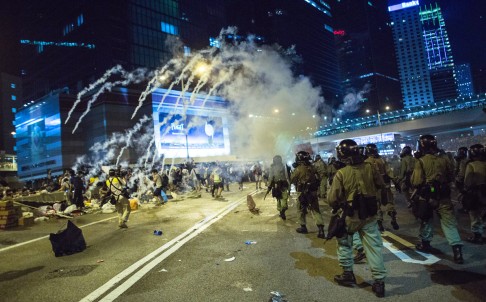
Britain announced yesterday that it would not ban exports of tear gas to Hong Kong or revoke export licences to supply the city. Photo: Bloomberg
Britain announced yesterday that it would not ban exports of tear gas to Hong Kong or revoke export licences to supply the city.
Business Secretary Vince Cable said the decision was based on Foreign Office advice.
The Hong Kong police used 87 tear gas canisters on September 28 to disperse pro-democracy protesters in Admiralty. The force has bought at least 14,000 rounds of tear gas from Britain in the last three years at a cost of HK$13.8 million.
In a written reply to the chairman of the Committee for Arms Export Controls, Cable said: "The foreign secretary has advised me that the use of tear gas by the Hong Kong police was an 'uncharacteristic response' at an earlier stage of the protests … and was not indicative of a wider pattern of behaviour."
Britain previously set a precedent in banning tear gas exports. After a crackdown on the pro-democracy movement in Bahrain in 2011, Britain revoked licences and permits for arms exports to the Middle East nation, including tear gas canisters.
READ MORE: Click here for all the latest Occupy Central stories
William Hague, foreign secretary at the time, said there was "no evidence" that UK-made tear had been used in Bahrain. But in Hong Kong's case the government confirmed it had licensed exports of tear gas to the city.
Andrew Smith of the Campaign Against Arms Trade said: "When the UK sells weapons it not only facilitates the attacks they are used in, it also signals an approval for the governments that are carrying them out."
A spokeswoman for the Department of Business, Innovation and Skills said it would take the Hong Kong disturbances into account in assessing future applications for export licences.
This article appeared in the South China Morning Post print edition as Britain will not ban tear gas exports
How social media shapes Occupy: Web forum HKGolden.com takes off
The huge jump in page views of a web forum reflects the importance of social media in shaping the pro-democracy Occupy Central movement
PUBLISHED : Friday, 31 October, 2014, 4:33am
Occupy movement protesters in Mong Kok. Photo: Sam Tsang
A popular web forum, seen as an unofficial organising tool for the pro-democracy Occupy Central protests, has recorded a tenfold jump in page views in the last month, reflecting the importance of social media in shaping the protest.
HKGolden.com made headlines this month after a young man was arrested for posting a message on the forum allegedly encouraging people to charge at police and block rail lines. Since then, forum users have been using code words to avoid referring directly to their sit-in participation.
Before September 28, the Chinese-language platform logged about 300,000 hits a day in its current affairs chat room, HKGolden.com's chief executive, Joe Lam Cho-shun, said. That skyrocketed after that Sunday, when police fired 87 canisters of tear gas at protesters in Admiralty.
 "In the few days after that, we were getting 2.9 million page views a day," said Lam, known as the "godfather" of the forum.
"In the few days after that, we were getting 2.9 million page views a day," said Lam, known as the "godfather" of the forum.
The website has 300,000 registered users. Readers do not need to register unless they want to post or comment.
The site became a place where the online community could get the latest Occupy updates, share protest tactics and encourage people to become "occupiers". Users dished out suggestions for what protesters should bring to the sites, such as food, water and masks to help protect against pepper spray.
On October 17, after police officers tore down many street barricades in Mong Kok, taking back a large portion of the protest site, a message appeared on the forum: "Warriors on Lung Wo Road and Mong Kok, let's stand united. The battle this time will be the turning point of the revolution … If we take back Mong Kok, this will enter a new stage.
"If we have to, we can block MTR stations and paralyse the MTR."
According to a police source close to the investigation, the poster, writing under the pseudonym "Lee Siu-ming", was a 23-year-old man. He was arrested in Tin Shiu Wai on October 18 for accessing a computer with criminal or dishonest intent and for unlawful assembly. He was released on bail. The suspect was not related to any political party or triad group, the source said.
Critics on social media said the man was not accused of carrying out unlawful acts, but simply writing about them.
Soon after the message appeared on the forum, thousands of people flocked to Mong Kok in case police tore down more barricades. Police used pepper spray and batons on the crowds.
HKGolden.com later posted a notice saying forum users should not prod people to join the protests. "We hereby tell everyone not to post anything that can be considered illegal," the notice says. "This is because, regardless of the court's final ruling, the accused will go through a long period of mental distress."
That was when coded language emerged. Participants said they were, for instance, "going hiking" or to a "karaoke" bar, when they were going to sit-ins.
"Bring a torch to go hiking at night so you will not be afraid of the dark. Also, do not go to the dark corner by mistake," one person wrote, referring to the now infamous area in Tamar Park where police allegedly beat Civic Party member Ken Tsang Kin-chiu on October 15.
READ MORE: Click here for all the latest Occupy Central stories
Barrister Albert Luk Wai-hung warned that internet users could still be arrested even if they communicated in code, as long as there was evidence showing their intention to defy the law.
If people write in code, "it will be difficult to prove the intention", Luk said. "But if the internet users have said directly before that they want to block the roads, and suddenly one day they start writing in code, they can still be arrested because they have [expressed] the intention."
At the request of police, HKGolden.com turned over the IP address of "Lee Siu-ming", Lam admitted.
Lam said the more police tried to crack down on online pleas to attend protests, the more persistent internet users would become in getting around law enforcement with coded messages.
He would not say if he backed Occupy or not, but noted: "The protesters were very civilised. It is hard to find a place where so many people gather, and yet the protesters are so calm."
Additional reporting by Clifford Lo
This article appeared in the South China Morning Post print edition as Umbrella code of conduct
PUBLISHED : Friday, 31 October, 2014, 12:15pm
UPDATED : Saturday, 01 November, 2014, 4:59am
Hong Kong must take on the tycoons after Occupy protests
Michael Chugani argues that Hong Kong cannot return to business as usual after Occupy Central and must confront vested interests
Occupy is about much more than just democracy. It is about our wealth gap, stagnant wages, and young people stuck in dead-end jobs with no hope of upward mobility. Photo: AFP
When it finally ends - and end it will, peacefully or violently - can we go back to business as usual by telling ourselves it was just a passing storm? There are those who will push to do exactly that, to go back to the Hong Kong as it was before September 28. In that Hong Kong the tycoons ruled. They had a stranglehold on the lives of seven million people. They controlled our supermarkets, pharmacies, phone companies, property market and most other things you can think of.
High home prices forced ordinary families into tiny subdivided flats, it took 14 years of saving wages to afford a 400 sq ft flat, prison-sized flats of 180 sq ft had an asking price of HK$2 million, high rents forced small shops out of business, a million people earned less than HK$10,000 a month, the median wage was just HK$14,000, big business fought against the minimum wage, opposed standardised working hours, and wanted more mainland tourists even though the millions who came each year had already eroded our quality of life.
That was the Hong Kong before September 28. And it is the Hong Kong those with vested interests want to go back to when Occupy Central ends. But if they think they can pretend it is business as usual they've missed the message of Occupy. Once again I ask them to wake up and smell the revolution. Occupy is about much more than just democracy. It's about our wealth gap, stagnant wages, and young people stuck in dead-end jobs with no hope of upward mobility while our tycoons climb ever higher on the Forbes rich list.
Do you think Occupy would have erupted with such force if the government's rule book wasn't so skewed in favour of the ruling class? Would so many young people have so willingly braved the sting of tear gas if they weren't so disillusioned about their future? I had warned before of a lit fuse leading to a time bomb. Occupy turned out to be that bomb.
The old order has to go. How, I don't know, because it's too well entrenched. Like him or loathe him, Chief Executive Leung Chun-ying did try to change things by taking on the tycoons with property cooling and other measures. He did take steps to tackle poverty and many other livelihood issues. That's why I found puzzling his remark that so-called genuine democracy would result in poor people dominating elections.
Can genuine democracy rid Hong Kong of the old order? Who knows, but it's pointless wondering about it. Beijing will never allow the Occupy movement's brand of democracy, which it fears will threaten national security. Our next chief executive will either be chosen through the existing undemocratic system if the Legislative Council votes down Beijing's reforms, or through one person one vote with screened candidates if Legco approves it.
Either way, the next leader and politicians will be playing with fire if they don't change their political playbook. Confrontation, Legco filibusters, grandstanding, and scoring cheap political points at the people's expense must give way to a new playbook on changing the old order. Otherwise, expect an even bigger explosion.
Michael Chugani is a columnist and TV show host.mickchug@gmail.com
This article appeared in the South China Morning Post print edition as Out with the old
'It's not fun': Occupy protester tells of sacrifices in the name of democracy
PUBLISHED : Friday, 31 October, 2014, 12:53pm
Vincent Lam joined the protests on September 27, after student leaders invaded Civic Square. Photo: Shirley Zhao
Vincent Lam Ngo-hin has worn out two pairs of shoes since the beginning of the Occupy Central protests a month ago. Now he is wearing a pair of well-used black flip-flops, bought near the protest zone in Admiralty.
Like many other protest stalwarts Lam has to walk considerable distances each day for basic needs and to help care for others. The 19-year-old’s favourite Nike trainers were torn on October 13, when hundreds of anti-Occupy people – including about 50 burly masked men dressed in black – tried to remove barricades set up by the protesters.
Lam, a freelance audio engineer, found himself at the forefront of the confrontation as the men used cable cutters to sever plastic cords holding the barricades together at the junction of Queensway and Cotton Tree Drive. He was wrestled to the ground and beaten, he says.
More than two weeks later, he still has bruises on his arms, legs and ribs to prove it. “I grew up being beaten by others so I didn’t care,” says Lam, who quit school at the age of 17 and admits to a rough background.
“But there were ladies and students. I had to get up and protect them.”
The gangly teenager joined the pro-democracy sit-in on Harcourt Road in Admiralty on September 27 – a day before Occupy Central leaders declared that the occupation had begun. He says he got involved for the future of Hong Kong and because he dislikes Beijing and Chief Executive Leung Chun-ying for betraying the city.
READ MORE: Click here for all the latest Occupy Central stories
That sense of betrayal came on August 31 when the Standing Committee of the National People’s Congress set a restrictive framework on Hong Kong’s electoral reform. Protesters blamed Leung for not reflecting the true public desire for genuine universal suffrage to the central government and demanded his resignation.
The protests – largely peaceful with occasional violent confrontations – remain in a stalemate with no solution in sight.
Over the past month, Lam has tasted police pepper spray and tear gas. He hasn’t been able to work and has been to his home in Yuen Long only twice.
Every morning he washes himself in one of the public toilets outside the government headquarters and the Legislative Council complex. The toilets have been transformed into makeshift bathrooms by thousands of protesters camped near the area, with dozens of bottles of shampoo, shower gel, shaving cream, aftershave and other personal care items stored neatly inside.
Food isn’t an issue for Lam. He can grab what’s on offer at one of the supply stations in the protest zone. Every day, the supply stations will hand out free food, such as crackers, biscuits, bread and fruit. Occasionally, restaurants or people supporting the movement will drop off meal boxes, home-made dishes or sandwiches.
Lam spends most of his days helping at the supply stations, distributing materials to other protesters, giving directions or carrying heavy supplies for others. In the afternoons, he goes to Hong Kong Park Sports Centre on Cotton Tree Drive about a 15-minute walk away for a shower. A female friend washes his clothes in the toilets and hangs the laundry on top of his tent to dry.
“It’s not fun,” he says. “Who wants to sleep on the street when you have a home to return to and bed to sleep in? Here, when it’s hot it’s killing you, when it’s cold it’s killing you, when it rains it’s miserable too, and you have to walk such a long distance just to have a shower.
“I don’t have much money saved either and now I’m not working. To sit idle and eat … in time all your money will be used up.”
Despite the hardship, he’s not planning to go home, and he has gradually taken on the role of a protector. “I don’t know why, but I just want to protect the women and students,” he says. “No one ever invited me to protect them. I think I just do.”
Lam joined Occupy Central against his parent’s wishes. Regardless of their differences, he says he got a phone call from his father one day asking if he was still at Admiralty and told him to take care of himself. A few days later Lam’s father, who he says “doesn’t know how to express himself”, asked his wife to buy and deliver their son some groceries. Later he visited his son at the Admiralty protest site.
Lam says he didn’t cry when he saw his father, but he was very emotional. Lam hopes the stand-off can be resolved soon as he is turning 20 next month. He says he does not want to celebrate his birthday on the streets of Admiralty, although three of his friends have already celebrated their birthdays at the protest site.
“The way I want to spend my birthday? With a bunch of my friends throwing a junk party, going to a pub or even singing karaoke is nicer than staying here,” he says. “But the worst case scenario … I will stay, of course.”
This article appeared in the South China Morning Post print edition as Help for his friends
Pan-democrat lawmakers ready to step up after student-government talks stall
Former leader Tung Chee-hwa signs alliance petition calling for halt to protests
PUBLISHED : Friday, 31 October, 2014, 2:41pm
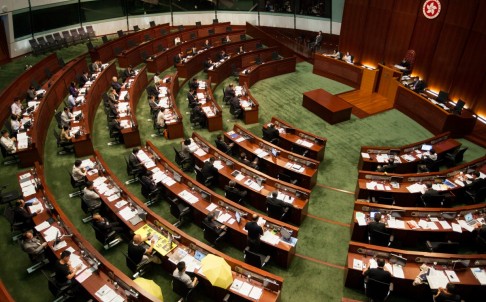
Pan-democrats are ready to step up their efforts over Occupy. Photo: EPA
Pan-democrat lawmakers are ready to step up their efforts to resolve Hong Kong's political crisis after talks between the government and student leaders last week failed to provide a breakthrough.
This came as former chief executive Tung Chee-hwa signed the Alliance for Peace and Democracy's petition calling for an end to the Occupy protests and backing the police. The alliance said it had collected more than 1.3 million signatures by yesterday. The campaign ends tomorrow.
With no sign of a second round of government-student talks, the city remains mired in a stalemate with protests now in their second month. The Federation of Students has indicated little interest in further dialogue, and the feeling is mutual on the government side.
Pan-democrat lawmakers, who have been playing second fiddle to the students since the occupation began on September 28, now want to step in to discuss an exit plan with the government.
But even if they manage to strike a deal, whether that will be enough to end the amorphous protest movement is unclear.
Alan Leong Kah-kit, who convenes a weekly gathering of 23 pan-democrat lawmakers, raised the idea of talks with the government on Wednesday when he met Chief Secretary Carrie Lam Cheng Yuet-ngor in the Legislative Council antechamber.
The legislators want to discuss the government proposals raised at the meeting between officials, led by Lam, and student leaders nearly two weeks ago. At the time, Lam said the local government could file a report to the central government to reflect the latest public mood, and to establish a "multiparty platform" to hammer out a path to constitutional development beyond 2017.
The proposals failed to satisfy student leaders, who insisted that Beijing should retract its decision to place tight restrictions on Hong Kong's electoral methods.
Since the pan-democrats would eventually vote in Legco on the government's proposal for how the 2017 chief executive election should work, they were in a position to discuss the issues with Lam, reasoned Leong.
Lam has remained coy about the request for talks.
The camp is pondering the possibility of members resigning from Legco to trigger by-elections they would see as a de facto referendum on electoral reform.
Leong said the camp had not decided whether or how to make such a move. He said there were two ways to trigger a vote. One of the five "super seat" lawmakers, for whom 3.2 million voters would be eligible to vote, could resign, triggering a city-wide election. Or five pan-democrats, one from each of the five geographical constituencies, could resign.
Sin Chung-kai of the Democratic Party, which holds two "super seats", said his party preferred the second option because there was no certainty of pan-democrats holding on to a "super seat" in a by-election and because the second option could involve more parties.
Leong said the by-elections would have to be held before Legco voted on electoral reform.
He also said the pan-democratic camp would not attend government consultations on the policy address and budget.
Regarding pan-democrats' call for a meeting with the chief secretary, a government source said it would "welcome dialogue with various sectors including lawmakers".
"However, it was the Federation of Students who [first] sought a dialogue with the government. We will wait and see if pan-democrats are really interested in engaging us," the source said. "We will also need to assess what can be achieved by talking with the pan-democrats."
Dr Chan Kin-man, an Occupy co-founder, said: "Officials may question the value of holding talks with the pan-democrats as [lawmakers] may not be able to persuade protesters to go home. Pan-democrats are worried about being accused by protesters of hijacking the movement if they take the lead in talks with the government."
However, Alex Chow Yong-kang, the federation's secretary general, urged pan-democrat lawmakers to take up a role in talks with the government.
Without a clearly defined and unified leadership, the protest movement is driven largely by two student groups - the federation and Scholarism. The three co-founders of Occupy Central play a secondary role.
Over the past weeks, leaders of the two student groups have held frequent meetings with pan-democrat lawmakers, Occupy Central founders and civil groups.
Chan said if pan-democratic lawmakers could play a more prominent role, it would help resolve the stalemate over political reform.
Occupy leaders earlier proposed holding an electronic vote at the three protest sites. But the idea, announced on Thursday last week, met with a lukewarm response from protesters and the plan was scrapped.
This article appeared in the South China Morning Post print edition as Democrats seek role to end Occupy impasse
HSBC board member Laura Cha sparks anger after comparing Hongkongers to freed slaves
PUBLISHED : Friday, 31 October, 2014, 4:53pm
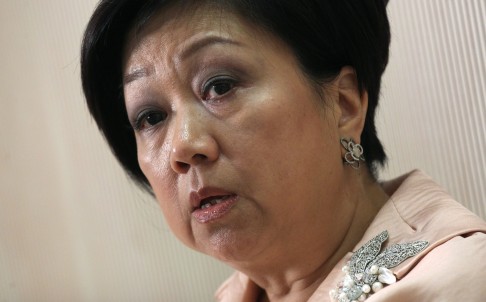
Laura Cha said democracy could not be reached in just one step and warned that investors’ confidence in Hong Kong was at a critical point. Photo: Dickson Lee
Thousands have signed an online petition denouncing reported comments by an HSBC board member in which she likened protesters’ demands for democracy to the emancipation of slaves.
Laura Cha Shih May-lung, who is also a member of the Executive Council, chairwoman of the Financial Services Development Council and a member of the National People’s Congress, was quoted as making the comments at an event in Paris.
“American slaves were liberated in 1861 but did not get voting rights until 107 years later, so why can’t Hong Kong wait for a while?” a local newspaper on Thursday quoted Cha as saying, referring to demands for free elections in the city.
Cha said democracy could not be reached in just one step and warned that investors’ confidence in Hong Kong was at a critical point, the newspaper added.
In a statement on Friday, Cha responded to criticisms made in the petition.
“Mrs Cha’s comment on the Civil Rights Act and the Voting Rights Act was by way of example that every country’s path to democracy was evolved in its own historical context. She did not mean any disrespect and regrets that her comment has caused concerns,” the statement read.
READ MORE: Click here for all the latest Occupy Central stories
HSBC’s Asia-Pacific chief Peter Wong Tung-shun declined to comment on the remarks, while the Financial Services Development Council did not immediately respond to a request for comment.
The comments triggered outrage on social media and more than 5,000 people had signed the petition by Friday afternoon.
“We, the Hong Kong public, will not stand these remarks likening our rights to slavery, nor will we stand the kind of voter disenfranchisement her and her associates attempt to perpetrate on the Hong Kong public,” said the petition to HSBC, that sought an apology from Cha.
The petition is addressed to the HSBC board of directors and is signed “The People of Hong Kong”.
China has ruled Hong Kong since 1997 through a “one country, two systems” formula which allows wide-ranging autonomy and freedoms not enjoyed on the mainland and specifies universal suffrage as an eventual goal.
But Beijing said in August it would screen candidates who want to run for the city’s election for a chief executive in 2017, which democracy activists said rendered the notion of universal suffrage meaningless.
For more than a month, key roads leading into three of the city’s most economically and politically important districts have been barricaded with wood and steel by thousands of protesters.
The protests drew well over 100,000 at their peak.
The Hongkong and Shanghai Banking Corporation, which was established in 1865 to finance growing trade between Europe, India and China, has for decades been the most prominent retail and commercial bank in Hong Kong, using the city as a bedrock for its global expansion. HSBC has the largest branch network in mainland China of a foreign bank.
The controversy is the latest to drag HSBC into Hong Kong politics.
Earlier this year, Next Media said HSBC and Standard Chartered had pulled millions of dollars worth of advertisements from Apple Daily after they were pressured by Beijing.
Apple Daily is owned by media magnate Jimmy Lai Chee-ying, an outspoken critic of Beijing who has supported pro-democracy activists through his publications and with donations.
HSBC and Standard Chartered have said the decision to pull the advertising was for commercial reasons.
Cha’s comments came just days after Chief Executive Leung Chun-ying triggered a wave of criticism when he said that free elections were unacceptable partly because they risked giving the poor and working class a dominant voice.
Pan-democrat leaders have utterly failed student protesters
Grenville Cross says senior pan-democrats have been wholly ineffective in offering leadership or advice to student protesters, in particular about the sanctity of the rule of law and the potential consequences of their actions
PUBLISHED : Friday, 31 October, 2014, 4:57pm
It is a crying shame that, just when the student protesters need sage advice from their elders, the pan-democratic leadership is unable to step up.
Politics," said Otto von Bismarck, "is the art of the possible." The assurance by the former chief executive, Tung Chee-hwa, that the central authorities will not use force to remove Occupy protesters, as they have confidence that the police force can handle the situation, is welcome. If Beijing intervened militarily, this could herald the end of "one country, two systems".
In any event, the chances of the current system continuing after 2047, when the Basic Law's promise of "50 years unchanged" concludes, are already uncertain, and they would be greatly diminished by armed intervention. Some people, however, would privately relish this outcome, not least because it would represent a significant policy failure for Beijing, and also make the chances of Taiwan ever returning to the national fold even less likely.
Last June, when the State Council issued its white paper on Hong Kong, it emphasised that the continued practice of "one country, two systems" in Hong Kong required that "we proceed from the fundamental objectives of maintaining China's sovereignty, security and development".
Sovereignty and security are, therefore, the keys. The spectacle, for example, of leading pan-democrats courting prominent politicians in foreign capitals earlier this year will have incensed Beijing. The rawest of nerves will also have been touched by the revelation that huge amounts of cash have been covertly channelled into opposition purses.
Moreover, many of those who are now loudest in their calls for democracy are the very same people who, in 2003, were most vocal in opposing Tung's national security legislation, which is surely no coincidence.
Had Tung's proposals on treason, secession, sedition and subversion against the central government been implemented, there is little doubt that Beijing would, when it announced its plans for the 2017 election last August, have been far more accommodating towards local democratic aspirations, and less insistent on the patriotic credentials of the next chief executive. To that extent, therefore, the pan-democrats have shot themselves (and Hong Kong) in the foot, and their earlier intransigence has now been repaid in kind, although they have since switched tack.
READ MORE: Click here for all the latest Occupy Central stories
After the police used tear gas on protesters who violently attacked their cordon on September 28, some people were genuinely concerned, although many pan-democrats shed what were clearly crocodile tears. They cynically exploited the incident to try to discredit the police, and, insofar as they had any regrets, it was, presumably, that only 87 gas canisters were fired. Again, when triad heavies appeared at the protest site in Mong Kok, an attempt was made to malign the police with a preposterous claim that they were somehow in cahoots with the triads, surely a smear too far.
What they really needed, however, was a martyr, and they found one. Once police officers were caught on camera allegedly beating a protester, who had himself allegedly tossed a noxious liquid over officers from a height, they duly milked the incident for all it was worth.
Even the pan-democratic lawyers who, of all people, should have known better, hysterically demanded that the police officers be hung, drawn and quartered, when they had not even been charged with an offence, let alone convicted. So much for fair-trial guarantees, or innocent until proven guilty, and to hell with the legal niceties.
Meanwhile, the protesters themselves have gone out of their way to upset mainland sensitivities. After Scholarism leaders insulted China at Bauhinia Square on National Day, by turning their backs on the flag, other protesters christened their squatting area the "Democracy Square", while others played up the "umbrella revolution", all red rags to Beijing's bull. If the protesters thought such tactics would help win friends and influence people where it really mattered, they were sorely mistaken, and Beijing has refused to give an inch. Perhaps, for many, it is the fight that counts, and not the victory.
Although some people have admired the idealism of the students, the senior pan-democrats themselves are bereft of ideas, and have, in consequence, become marginalised and irrelevant. Rather than moulding events, they have been dragged along by them, and have resorted to posturing and bluster, always poor substitutes for leadership.
Instead of cautioning the protesters that court orders must be respected, that the criminal law should be upheld and that the rule of law is sacred, the pan-democratic leaders have become mere bit players, shamelessly egging the young people on to ever more audacious acts of defiance, irrespective of the consequences.
After all, the protesters have been engaged in allegedly unauthorised assemblies on the streets for many weeks, and offences of riot, affray, criminal intimidation, wounding and assault may also have been committed. These, on conviction, are punishable with long prison terms. If convicted of any of these crimes, the consequences for the offenders will be severe, not least in career terms. The courts may try to be as lenient as they can, but this may not be possible if continuous law-breaking is involved or the crime is grave.
Those who are prosecuted may well try to pose as martyrs for their cause, but, at some point, reality will kick in. It is a crying shame that, just when they need sage advice from their elders, the pan-democratic leadership is, grandstanding apart, wholly unable to step up to the plate.
Sometime soon, Secretary for Justice Rimsky Yuen Kwok-keung will have to decide which protesters are to be prosecuted, and on what charges. However, Yuen, who belongs to the three-person task force responsible for promoting the government's constitutional reform package, is clearly conflicted, as the suspects will have got into trouble for opposing his own reforms.
Therefore, to avoid being blasted like the police for bias, he will need to disengage from the prosecution process, and leave the cases to the director of public prosecutions, a neutral figure without ministerial responsibilities.
Grenville Cross SC is a criminal justice commentator
This article appeared in the South China Morning Post print edition as Found wanting
http://www.scmp.com/topics/occupy-central
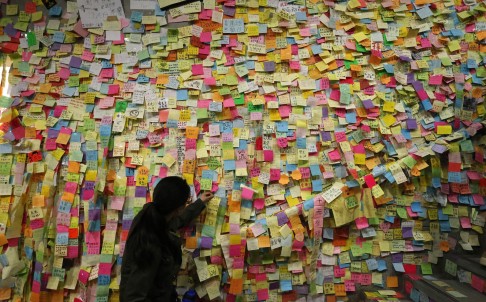


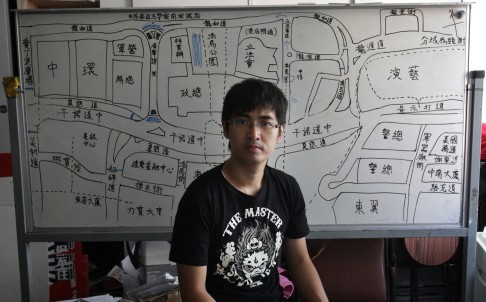
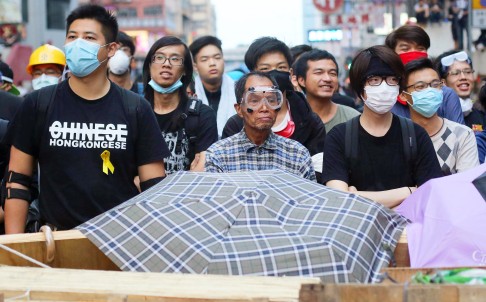


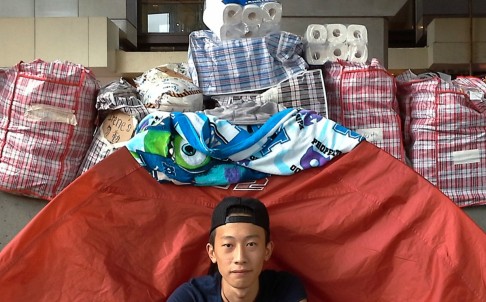


沒有留言:
張貼留言